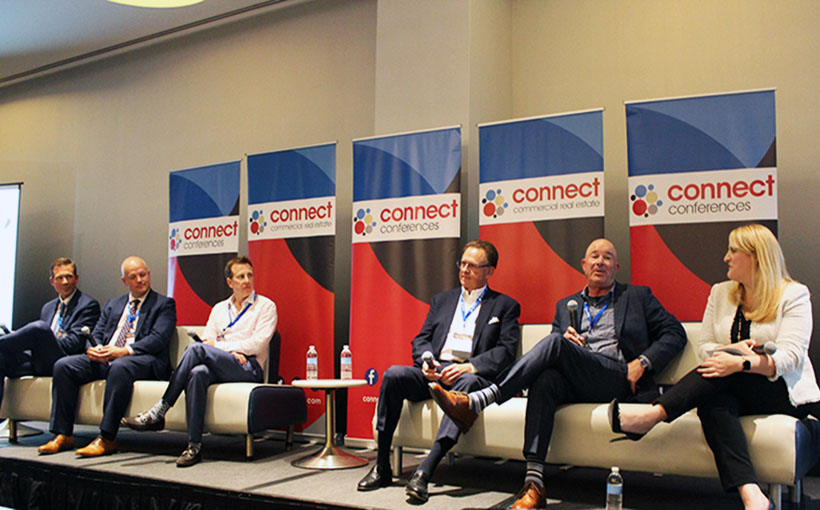
By Amy Wolff Sorter
The recent Connect Texas Multifamily conference brought together brokers, developers, lenders and investors, who spent much of the afternoon networking and listening to panelists. Among those panelists were a broker, developer, two investors and two lenders, who made up the “Industry Leaders: A View from the Top” panel. Moderated by CBRE’s Aimee Morgan, the session focused on where the multifamily industry is now, where it’s headed, and the opportunities and challenges.
One issue bandied about involved costs. Westmount Realty Capital’s Brant Brown noted that, between debt, insurance, increasing property taxes in Texas and labor, “it’s harder and harder to buy and operate deals today.” This, then, led to the issue of how to control costs. Jeff Olshan with Passco told the audience that national contracts with large vendors is one way his company controls costs. Furthermore, a focus on renewals also helps. “It’s a lot easier to predict what will happen with a renewal, than with a new tenant,” he observed.
Christopher Finlay, with Lloyd Jones Capital, focused on another consequence of the apartment boom — that of not enough labor on the operating side. People, especially young people, aren’t moving into property management. “Lots of young people don’t consider this a career, for some reason,” he said. “From an employment view, it’s about who do you steal from down the street.”
Shifting gears, the topic of technology also led to an interesting discussion from the panelists, with Scott Beck of Beck Ventures Inc. noting that technology involves more than slapping Wi-Fi into an apartment complex. For example, artificial intelligence can provide data, especially as humans interact more fully with machines. Facial recognition is the next step. “It’s kind of creepy in how it’s working,” Beck said, “but it’s there. Putting the right technology in place now is important, especially with what’s coming on.”
While Finlay and Olshan felt business intelligence would be helpful when it comes to predictive analytics, Brown’s concern was that technological success might have another talk. “We can’t get away from that feeling in the gut, when real estate doesn’t feel right, or doesn’t make sense,” he noted, adding that, while computers can be a relevant tool, human experience shouldn’t be ignored.
And, Jeffrey Erxleben with NorthMarq attempted to calm the waters about the slowdown of GSE lending. While Fannie Mae and Freddie Mac take up 55% of the market, both groups have limits on what they can offer on an annual basis, he said. The current state of angst in the market is probably well-founded, especially with the ever-changing, current spreads offered by the agencies. However, “if you look outside the agencies, there’s quite a bit of liquidity,” Erxleben pointed out. “There is quite a bit of competition. It is something that is changing, though, and will continue to be a challenge for the rest of this year, and next year, going forward.” Added Olshan: “I don’t think the agencies are going anywhere before the elections. There will still be money to lend.”
When Morgan asked the panelists about their forecasts for the multifamily sector in Texas, everyone was unanimous in that the outlook continues positive, even with some angst about the economy. “This country is in great shape, when you consider the rest of the world, Finlay observed. “Things will slow down, interest rates will go down, but we have the Fed that is hopefully smart enough to control things.”
Beck, in the meantime, focused on the fact that the U.S. is now energy-independent, with much of that energy coming from Texas. “If we can keep interest rates correct, and not continue raising them, we’ll continue in a pretty good spot,” he said, also noting that his concern was more deflation, rather than inflation.
Olsham agreed with others’ forecasts, though noted that investors who aren’t highly leveraged and who control expenses and drive income through fundamentals will do well with multifamily. “It’s only when we step outside our comfort zone to drive a deal home that there might be problems,” he said, adding that now was not the time to take a calculated risk in the market.
Erxleben agreed, pointing out that Texas is benefitting from a constant flow of in-migration and corporate relocation; the effects have yet to be realized from these. “Like anything, there will be bumps along the way,” he said. “But the outlook is positive when you think about Texas.”
Pictured (l-r): Jeffrey Erxleben (NorthMarq), Brant Brown (Westmount Realty Capital), Scott Beck (Beck Ventures Inc.), Christopher Finlay (Lloyd Jones Capital), Jeff Olshan (Passco), Aimee Morgan (CBRE).


